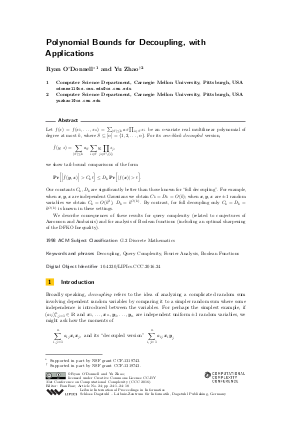Polynomial Bounds for Decoupling, with Applications
Authors Ryan O'Donnell, Yu Zhao
-
Part of:
Volume:
31st Conference on Computational Complexity (CCC 2016)
Part of: Series: Leibniz International Proceedings in Informatics (LIPIcs)
Part of: Conference: Computational Complexity Conference (CCC) - License:
 Creative Commons Attribution 3.0 Unported license
Creative Commons Attribution 3.0 Unported license
- Publication Date: 2016-05-19
File

PDF
LIPIcs.CCC.2016.24.pdf
- Filesize: 0.52 MB
- 18 pages
Document Identifiers
Subject Classification
Keywords
- Decoupling
- Query Complexity
- Fourier Analysis
- Boolean Functions
Metrics
- Access Statistics
-
Total Accesses (updated on a weekly basis)
0Document
0Metadata
Abstract
Let f(x) = f(x_1, ..., x_n) = sum_{|S|<=k} a_S prod_{i in S} x_i be an n-variate real multilinear polynomial of degree at most k, where S subseteq [n] = {1, 2, ..., n}. For its one-block decoupled version, vf(y,z) = sum_{abs(S)<=k} a_S sum_{i in S}} y_i prod_{j in S\{i}} z_j, we show tail-bound comparisons of the form Pr(abs(vf)(y,z)) > C_k t} <= D_k Pr(abs(f(x)) > t).
Our constants C_k, D_k are significantly better than those known for "full decoupling". For example, when x, y, z are independent Gaussians we obtain C_k = D_k = O(k); when x, by, z are +/-1 random variables we obtain C_k = O(k^2), D_k = k^{O(k)}. By contrast, for full decoupling only C_k = D_k = k^{O(k)} is known in these settings.
We describe consequences of these results for query complexity (related to conjectures of Aaronson and Ambainis) and for analysis of Boolean functions (including an optimal sharpening of the DFKO Inequality).
Cite As Get BibTex
Ryan O'Donnell and Yu Zhao. Polynomial Bounds for Decoupling, with Applications. In 31st Conference on Computational Complexity (CCC 2016). Leibniz International Proceedings in Informatics (LIPIcs), Volume 50, pp. 24:1-24:18, Schloss Dagstuhl – Leibniz-Zentrum für Informatik (2016)
https://doi.org/10.4230/LIPIcs.CCC.2016.24
BibTex
@InProceedings{odonnell_et_al:LIPIcs.CCC.2016.24,
author = {O'Donnell, Ryan and Zhao, Yu},
title = {{Polynomial Bounds for Decoupling, with Applications}},
booktitle = {31st Conference on Computational Complexity (CCC 2016)},
pages = {24:1--24:18},
series = {Leibniz International Proceedings in Informatics (LIPIcs)},
ISBN = {978-3-95977-008-8},
ISSN = {1868-8969},
year = {2016},
volume = {50},
editor = {Raz, Ran},
publisher = {Schloss Dagstuhl -- Leibniz-Zentrum f{\"u}r Informatik},
address = {Dagstuhl, Germany},
URL = {https://drops.dagstuhl.de/entities/document/10.4230/LIPIcs.CCC.2016.24},
URN = {urn:nbn:de:0030-drops-58520},
doi = {10.4230/LIPIcs.CCC.2016.24},
annote = {Keywords: Decoupling, Query Complexity, Fourier Analysis, Boolean Functions}
}
